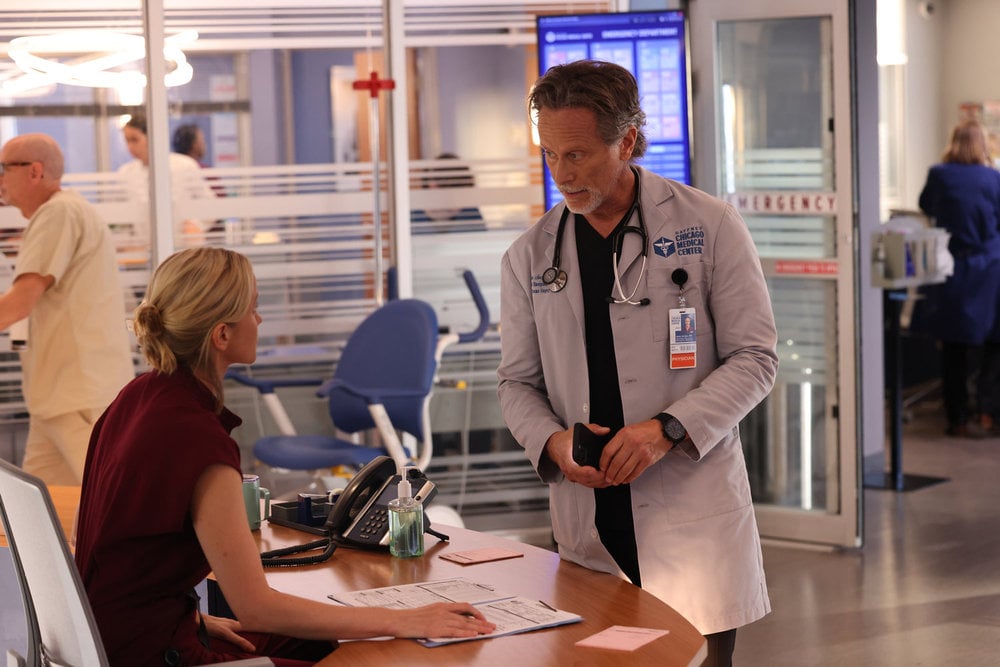Thank You Chicago Med For Writing Hannah’s Mental Health Issues Sensitively

I’m so glad that Hannah didn’t use on Chicago Med.
Too many times, addiction is portrayed on TV as something that comes up all of a sudden, rendering the person helpless so that they have no choice but to give in, even after years of sobriety.
That’s not exactly how it works, and I’m grateful that Chicago Med is writing about Hannah’s mental health issues more sensitively than that.

Why It’s So Important That Hannah’s Mental Health Issues Are Depicted Correctly
I often get frustrated with how television portrays addiction and other mental health issues.
These issues affect real-life people, and it isn’t okay when TV shows promote harmful stereotypes or misinformation.
People SHOULDN’T base life decisions on what happens on TV, but the fact is we all get some of our ideas about how the world works from watching our favorite shows, often without realizing it.
When shows like Chicago Med get it right, they positively affect the audience in ways they may never know.
People might be inspired to ask for help or feel less alone because they see themselves in a fictional character.

How Chicago Med Got Hannah’s Mental Health Issues Right
Med did a near-perfect job of showing the other mental health struggles that were behind Hannah’s temptation to use.
Over the past several episodes, Hannah has been heading toward a crisis, and not just because Eloise died.
That was one of a million ways her life appeared to be unraveling, with her relationship with Ripley falling apart, Lenox questioning whether the ED really needed a full-time OBGYN, and Eloise’s refusal to trust her even before the tragic events.
Hannah’s downward spiral was written carefully, with one thing building on top of another and past trauma or negative events contributing to the choices she made.

For example, her need to protect Ripley from self-destructive impulses might have come from her knowledge of what she did to herself when she was in active addiction and wanting to ensure no one else made similar mistakes.
This approach worked because it avoided tired TV tropes about how mental health crises work, instead building upon Hannah’s past, her positive intentions in the present, and her frustration at not being heard.
Things reached a boiling point when Eloise died, with Hannah trying for nearly an hour to resuscitate her and then spiraling down into guilt and shame over her inability to save this woman.
The aftermath was equally well done. Hannah is the only TV character I can think of offhand who handled a potential relapse into addictive behavior by seeking help instead of giving in the second the urge hit.

Hannah’s Mental Health Issues Were More Than A Plot Point
Addiction is an important mental health issue that often stems from unresolved trauma, but it’s also too easy to use it in stories for the sake of drama.
The way alcohol and other drugs change people can lead to powerful storylines, and that’s why some shows jump quickly to characters being in full-blown, active addiction after having been sober for years.
Thankfully, Chicago Med didn’t do that. Hannah’s mental health issues have never been there for the sole purpose of moving the plot forward.
Writing her issues so thoughtfully and realistically has the side effect of sending an important message about addiction.
It is too easy to see a person’s addiction problem — or any mental health problem, really, as the sum total of who they are.
But Hannah has never been written that way, and as someone who lost a loved one to addiction, I’m grateful.

Hannah’s mental health issues are a part of her, but she’s always been written as a person first, someone who happens to have the flaw of having succumbed to temptation with her addiction in the past.
Chicago Med has always been careful to make her well-rounded.
Even before she got sober, she was trying her best, although it wasn’t a good idea for her to try to practice medicine while regularly getting high.
Afterward, she became committed to building a better life than the one she’d had so far, wanted to help others heal, and was involved in a lot more than the struggle to stay sober.
That makes her one badass woman.

It’s not easy to make something positive out of your life when you have to live with the pain of knowing what you’ve done to yourself in the past and the temptation to do it again to avoid that pain.
Hannah’s mental health issues do not stop her from moving forward the way they would on so many shows, and that’s what I love most.
She’s a survivor. She’s aware she has choices, and her hanging in there and doing the work she needs to do to protect her sobriety is inspiring.
It also destigmatizes addiction and other mental health issues, sending the strong message that having this type of problem does not mean you are irrevocably broken, destined for a bad life full of terrible choices, or any of the other lies people tell themselves because they have these issues.
I wish more shows would promote that type of social messaging, and I’m grateful to the Chicago Med writers and to Jessy Schram for letting Hannah’s humanity shine through every scene she’s in.

Over to you, Chicago Med fanatics!
How do you feel about the way Med handles Hannah’s mental health issues?
Hit the comments with your thoughts.
Chicago Med airs on NBC on Wednesdays at 8/7c and on Peacock on Thursdays.
Watch Chicago Med Online







